If you’re planning to get married in Morocco or if you’re visiting to attend a wedding in Morocco, knowing what to expect can be very helpful!
The Formalities of Marriage in Morocco
A typical Moroccan marriage begins with the bride and groom signing the marriage contract. Unlike in the west the actual wedding ceremony is not attended by many people. It is usually just the couple and the guardian (wali) of the bride. Days before the wedding occurs the process of obtaining the paperwork and marriage certificates begins. This looks different depending on whether both partners are Moroccan or if one is foreign. (Read my post on getting married in Morocco if you’re a couple with mixed nationalities)
Once the paperwork is in place the bride, groom, the wali and witnesses go in front of an imam to complete the marriage contract and sign the paperwork to finalize the wedding. The information in the marriage contract has been decided by the couple and their families ahead of time so this part is really a formality that takes very little time.
After the paperwork is signed the couple is legally and religiously married though often it’s not until after the wedding party that the marriage is considered “final.”
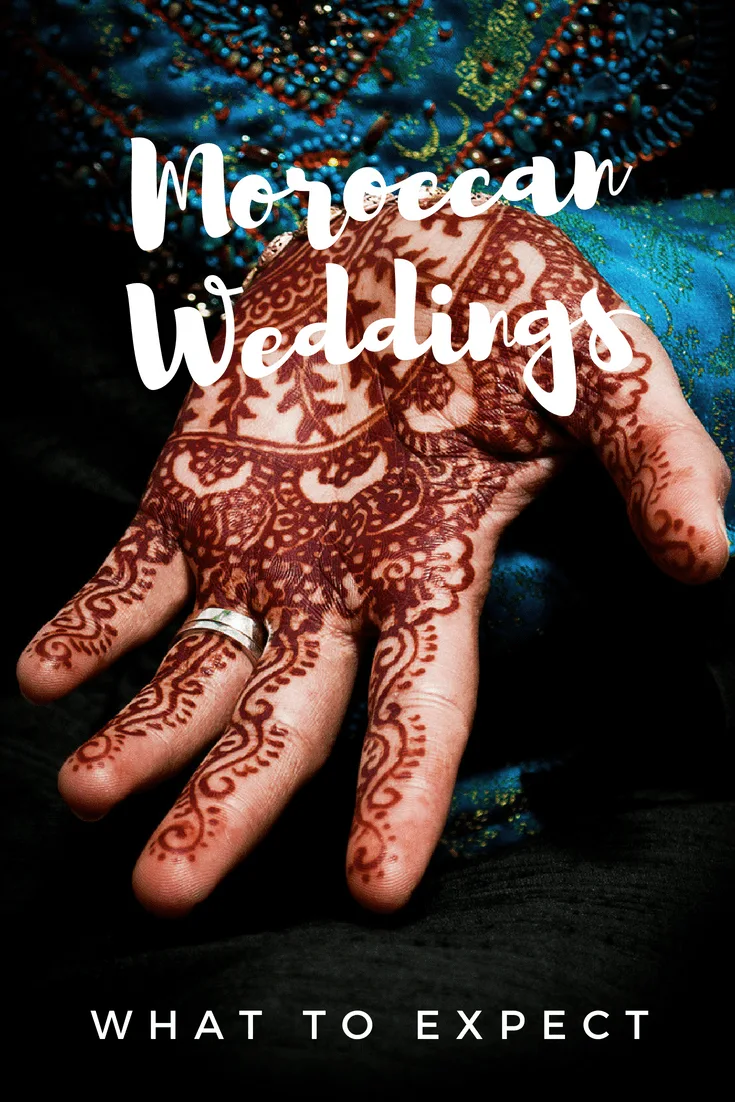
A Three Day Party
Traditional Moroccan weddings used to last seven days. The bride and groom’s families used to have parties in their own homes before the day where the bride actually meets the groom. Of course, every one of the two families were invited so that led to lots of days of partying. However today this really isn’t practical and rarely done. There are only one or two big parties (one at the brides’, one at the grooms’) or just one big party for both. There are also other nights to the celebration.
The Hammam Day
The wedding celebrations start with the hammam day for women. The bride gathers all the female family, friends, neighbors and goes with them to the hammam (public bath). Sometimes the hammam is rented to keep it for the wedding party celebrate. The bride gets her hair washed with ghassoul (a type of clay), her body scrubbed, massaged, perfumed, waxed and all prepped for the wedding night.
Moroccan Henna Party
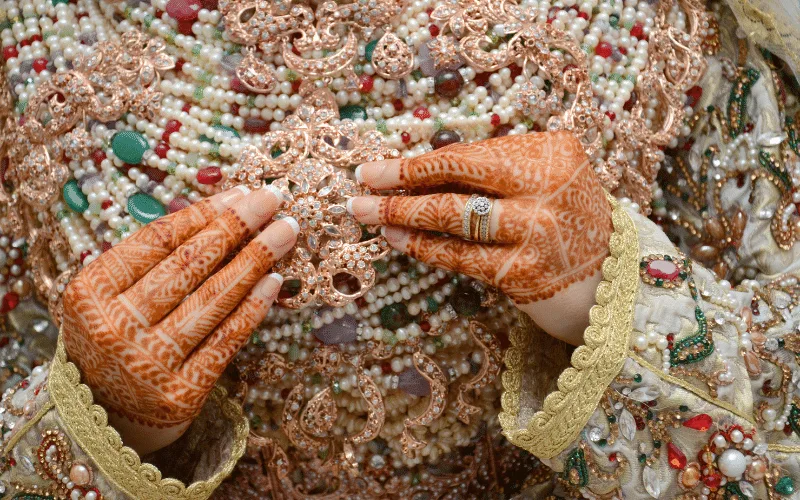
The next day is the henna ceremony. This is a female gathering around the bride who will have henna tattoos done on her hands and feet. The henna is not permanent and it fades with time but it gives a very beautiful traditional style to the bride. Henna is considered a sign of fertility, beauty and optimism for Moroccans. Henna is done for the bride for “fal” or to wish her lots of luck in her married life. All the female friends and relatives gets tattooed too when the bride is done, and there is a nice party where everyone dances and chants for the bride.
Sometimes during the time of the henna party the men gather for their own party. It is much more demur. Typically they gather together to share a meal, recite Quran and celebrate the man’s upcoming nuptials.
Who is in the Wedding Party
On the wedding party day the bride rests during the day and in the afternoon begins getting ready with makeup and the hairdresser. The wedding guests gather at the wedding site before the bride makes her entrance. The groom comes with his family and everyone waits for the bride to come. The brides’ entrance is very important in the Moroccan ceremony. She is usually placed in an “amaria” an elegant roofed platform that’s carried by 4 or 6 guys (they usually come with the Neggafa). The groom leads the walk with the Amaria bearers.
After that, the bride gets out of the amaria and sits near the groom in an elevated and decorated couch. People would come to sit next to them and take pictures all the evening long.
The bride goes to change for a second outfit and then the dinner is served. The couple eats in a family table with both parents and close family. Sometimes, the couple would use the time at the end of the dinner, to make a table tour and say hello to the guests. They would also dance one or two times during the evening with all the guests gathered around them.
Then the bride goes again to change for another outfit. It’s called “Labssa fassia”. It is beautiful but heavy as it covers almost every part of the body of the bride except the face. This outfit is specific for the tour in the “mida” another platform (unroofed this time). At this time, the groom also changes his suit for a more traditional jabador and djellaba outfit. There are usually two Midas (one for the bride and one for the groom) and they are both lifted up at the same time.
The bride and groom go for a final outfit changing and come back for the wedding cake. The groom puts his suit back and the bride has a normal occidental white wedding dress or a white takshita. The bride and groom share a last dance, eat the cake and leave after that for the wedding night.
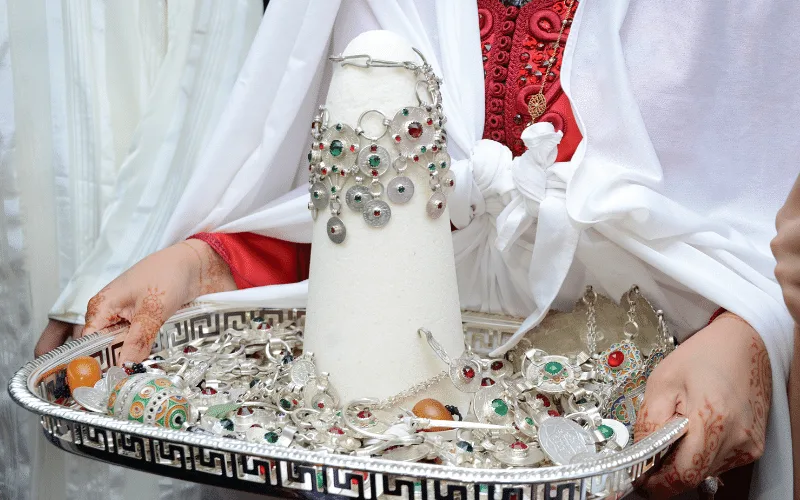
Choosing a Wedding Venue
Finding a nice place is of great importance especially if the wedding will be in summer aka “wedding time” in Morocco! Many places book up to one year in advance (and sometimes longer), so you’ll want to make a reservation as soon as possible for your chosen date.
There are beautiful places across Morocco that can hold a wedding. Big rooms at seaside and luxurious hotel ballrooms that any of the Moroccans would find very modern and fancy. There are also traditional Moroccan places with ceiling sculpturing (Nakch), zellige walls and big crystal chandeliers. You’ll want to consider the number of guests you’ll have so book a space that can hold your guests comfortably
What to wear to a Moroccan Wedding
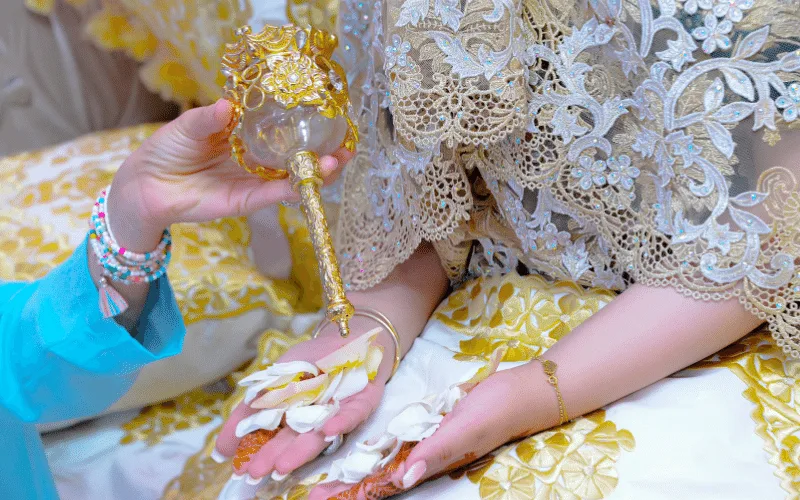
In every wedding, the bride is the main focus of the day. In Morocco, the bride is definitely the queen of the ceremony. A special lady called a “neggafa” is hired (usually she also has assistants). She is dedicated to the bride and what she will wear in terms of customs, gold accessories like jewelry and crowns, make-up, etc. The neggafa usually brings special wedding outfits (3 or 4 and sometimes more) and helps accessorize the takshitas (Moroccan dresses) the bride has. That’s why, the bride has to make sure that the neggafa has good taste and that the accessories she has would fit perfectly with the outfits.
The bride chooses the takshitas before the ceremony. These dresses typically reflect the different regions of Morocco. They are in multiple colors. The couch area that the bride and groom sit at during the party is also decorated and sometimes changed to reflect the bride’s clothing.
The groom usually wears a suit. He might change at some point into a tunic and pants called a jabador and a Moroccan male “djellaba”.
For those attending a Moroccan wedding as a guest, you should really feel free to dress up. Moroccan wedding guest attire is also quite elaborate. Most female attendees also wear a takshita and men wear suits. Women’s dresses can be very expensive and chances are you won’t be wearing it for daywear. The good news is that these dresses are available to rent from special dress shops across the country. If you are visiting and have a wedding invitation it’s probably best to rent one of these dresses instead of buying it.
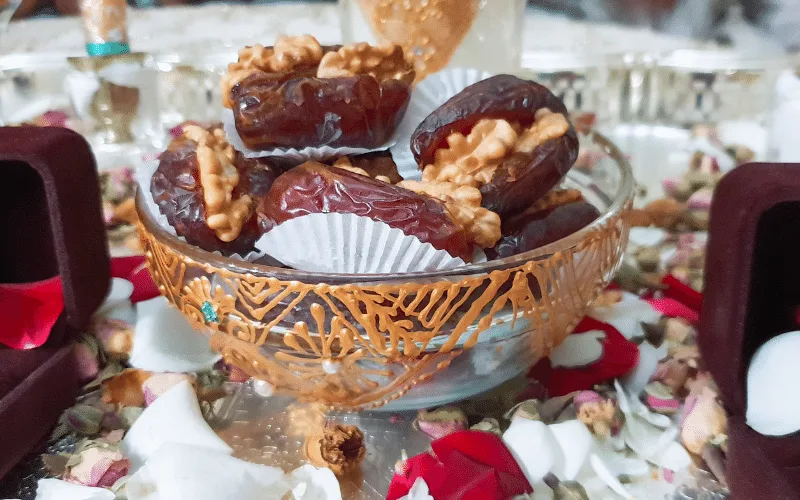
Moroccan Wedding Food
Usually, Moroccan weddings menus are quite similar. First, there’s a Moroccan food tradition that consists of welcoming the guests by serving them dates and a little glass of almond milk flavored with orange water. Then appetizers or cake and sweets and different sorts of juices (alcohol being forbidden by Islam, we don’t serve any of it).
When the bride and the groom make their entrance, the dinner follows right after. Some people serve two meat dishes like grilled chicken with saffron sauce and lamb tagine with prune and almonds, or one meat dish (chicken or lamb) and Seffa (short noodles sweetened and served with cinnamon and grilled almonds).
At some weddings, you might find a whole sheep (mechoui style) served at each table. The menu really can be decided by the couple. Families tend to spend quite a lot of money on the food for the event to make it really special. Dessert is usually simple and a big platter of seasonal fruit.
The evening goes on with different sorts of Moroccan cookies and cakes like ka’ab ghazal, ghriba, and other Moroccan pastries. accompanied of course with mint tea and coffee. There is also a wedding cake that marks the end of the party as the newlywed usually leave after that.
Typical weddings in Morocco start pretty late (9 PM or later) they usually finish early in the morning (5 or 6AM). Weddings finish so late that breakfast is usually served at the end of the party! Some breakfast foods include white harira soup, beghrir (pancakes), and msemmen. Again the menu can vary depending on the couple and region of the country.
Moroccan Wedding Music
Music is what makes the party live and having a good orchestra playing good music-making people dance is the secret for an unforgettable evening. Unlike western weddings at a Moroccan wedding, there is almost always a live band and performers. The band has to be good at “chaabi” music (Moroccan pop music) and also play more traditional “Ala” (Andalusia music) and local music from wherever the bride and/or groom are from.
A band is hired for the whole evening and another traditional band is hired whose job is to welcome the guests and accompany the entrance of the bride. These traditional bands play different music styles as they come from different regions of Morocco. They are called “dakakiya” if they come from Marrakech, “issawa” if they come from Meknes, “abidat rma” if from Beni Mellal, etc. Each one of them has its own style.
There is no specific order of events or way that a Moroccan wedding happens. While some are elaborate, expensive affairs, others are very simple and might only be the signing of the contract and a small family gathering. The only common thread is that marriage is a very big part of life in Morocco and an opportunity for families to join together and celebrate.
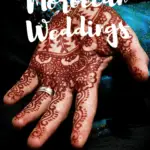
SS
Sunday 16th of July 2023
Hi, I am preparing for my wedding in Fes. This is all new to me and seems very overwhelming. What are some of the things I need to know before heading off? For example the dowry(Amount), gifts, outfits. As US a resident whwhat are the legal documents acceptable for marriage in Morocco?
Amanda Mouttaki
Sunday 16th of July 2023
I would highly encourage you to speak with your future spouse about what will be happening and for you to both decide what all of this looks like for you. There is no dowry, there is an agreement when you marry about what will be given to the wife. Legally, you need to have quite a few papers with you; again your partner should go to the adoul and/or a lawyer to arrange the papers. You can of course have a party but a legal marriage in a bit more involved.
Kel
Sunday 7th of August 2022
Hi I’m Australian and I married to my Moroccan husband here in Australia, I am curious if we want to have a second traditional religious ceremony there in morocco - would we still require all of the same legal paperwork that is listed to marry in Morocco or would our Australian marriage certificate and passports with my married name be accepted in order for us to do a Moroccan ceremony with an Iman?
Amanda Mouttaki
Saturday 13th of August 2022
You can probably find an imam that would do just a blessing type ceremony.
Laureen Lund
Sunday 20th of February 2022
Attending a wedding in Fes the bride is Moroccan, groom is French and I am American. Can you advice on what kind of gift I should bring or is cash expected? Thank you.
Amanda Mouttaki
Monday 21st of February 2022
Cash is always a good idea.
Libby Garnham
Sunday 30th of January 2022
Hello, I am the grooms mother & will be attending his wedding in September this year. Both bride & groom are British but live & work in Rabat. Can you advise on what to wear, how many outfits & where to purchase in the UK? The lighter the better as I suffer in the heat. Many thanks. Libby
Amanda Mouttaki
Sunday 30th of January 2022
I think I would first check in with your son and daughter-in-law to see what kind of attire they're planning to have guests wear/style of the wedding. If it's traditional Moroccan then I'd suggest either renting a dress when you arrive (there are many of all different weights of fabric) or purchasing something like a dressier kaftan. You might even be able to find something that is more Indian inspired easier to get than a Moroccan style there. I had a Moroccan dress made out of sari fabric and the fabric blended right in!
Azem
Friday 6th of November 2020
Hi I’m from the USA my fiance is from Morocco. Does the bride give a gift to the groom and groom to the bride? If so what is the custom?
Amanda Mouttaki
Wednesday 11th of November 2020
Usually the groom gives the bride many gifts as a part of their engagement. However with mixed couples sometimes the typical traditions are not always followed. This would be a very good conversation to have with your partner about expectations and what you both want from the process.